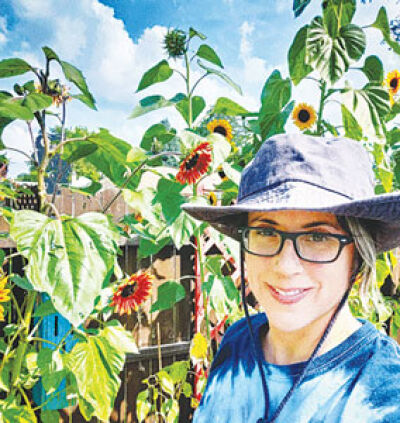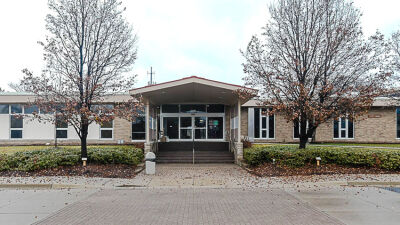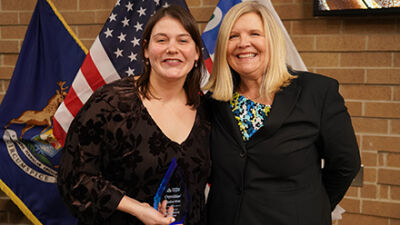
Madison Heights resident Eve Sandoval tends to sunflowers in her native garden. Native plants generally require less water and no herbicides or pesticides, and do a better job supporting local pollinator species. Members of the Environmental Citizens Committee will be selling native plants at Civic Center Plaza May 25.
File photo provided by Eve Sandoval
MADISON HEIGHTS — Gardeners can learn about the benefits of native plants and add them to their collection at an upcoming event — part of a larger effort by the city to support the ecosystem.
The native plant sale will take place from 2 p.m. to 5 p.m. Sunday, May 25 at Civic Center Plaza, 240 W. 13 Mile Road. The event is organized by the Bloom Project — part of the Madison Heights Environmental Citizens Committee — in collaboration with East Michigan Native Plants, LLC.
All plants at the sale are locally grown, without the use of any synthetic or organic chemicals. There will also be experts on hand answering questions, as well as other helpful resources.
“It really is a team effort,” said Nickole Fox, a member of the ECC. “For me, this also kicks off the growing season in a good way. I love visiting with friends and neighbors that come by, hearing their garden stories and how they’ve been nurturing the community.”
According to the ECC, native plants offer many benefits. They typically require less water since they have already adapted to our region and climate over thousands of years. They also don’t require pesticides or herbicides since they naturally repel invasive insect and plant species.
And just as native plants have adapted to our land, many animals have adapted to them. Milkweed, for example, is consumed by the caterpillars of monarch butterflies. Once they grow their bright orange wings, monarchs flutter across the country, pollinating plants used by humans.
That’s why the Bloom Project encourages everyone to do their part planting native species like those available at the sale.
Preorders are also being accepted at eastmichnatives.com/calendar until May 16. Scroll down to the May 25 listing for the Madison Heights sale to place an order, which can then be picked up at Civic Center Plaza the day of the event.
The sale will include a variety of native grasses and wildflowers, each with information on their needs in terms of sun exposure (full sun or partly shaded) and watering (from dry to wet), as well as the best season to cultivate them. The plants on the preorder form come in containers that measure 2.5 by 2.5 by 3.5 inches, and are priced at $5 each.
There are also gardening kits with preselected trays of 32 plants in 2.5-inch pots. The kits cost $120 each — a value of $3.75 per plant. There are four themes, including a grass kit with several species of native grass; a butterfly kit, with host plants for caterpillars and nectar plants for butterflies; a pollinator kit with nectar plants for bees, butterflies, hummingbirds and others; and a rain garden kit suitable for river/lake/pond shores, rain/ditch gardens and other wet areas.
Making an impact
Emily Rohrbach is a member of the Madison Heights City Council who also serves as the council liaison for the ECC. She said the sale is just one of many initiatives by the group.
The ECC recently announced the winners for its 2025 garden grants, which include $1,222 each for gardens at Page Middle School in the Lamphere Schools district and Madison District Public Schools’ Wilkinson Middle School. Nine residents also received $200 each.
“Many properties have a low point in their yard where water accumulates in the rainy season, and rain gardens feature plants that do a great job absorbing that water and in surviving in wet terrain. Native plants tend to have much deeper roots, so they do a more efficient job of handling water,” Rohrbach said. “And that reduces flooding, helps with biodiversity, provides habitat for wildlife and recharges the groundwater. It also really helps since there’s a monoculture of grass in every yard here, and grass isn’t the best at these things. Rain gardens help promote a healthier environment for all.”
She also said the city is working out its next waste hauler contract, a topic on which the ECC has been advising. The vendor will almost certainly be Priority Waste, since it’s the only company that provided a bid. However, there is debate on council over whether to switch to a “carts only” model that would provide the city a discount on the condition that residents switch to using the new trash and recycling carts that will be provided by the city later this summer or fall.
“We (the ECC) are recommending the carts-only model since it will help reduce the rodent issue by leaps and bounds,” Rohrbach said. “We often hear about neighbors putting out the trash at night and by morning those bags are shredded with trash in the streets. We’ll never solve the rodent issue if we’re always feeding them a smorgasbord of treats. These carts will reduce that access and rat population.”
Rohrbach also highlighted the ECC’s composting initiative. Residents can drop off food scraps ranging from bones, meat and eggshells to fruits and vegetables at the Department of Public Services, located at 801 Ajax Drive.
“It started with one bin but now it’s three bins being emptied twice a week,” Rohrbach said. “There’s also another one at Fire Station No. 1, since the firefighters cook food there all the time — they wanted to get in on it, so we have a bin there, too. We rolled that out and it’s been so successful, reducing our carbon footprint on the planet. We have even started having conversations with a company about a possible curbside composing service for residents that would be free of charge. We’re still exploring that idea, but it could be a huge impact. We could be the pilot city for the program.”
Mayor Roslyn Grafstein helped restart the ECC. She initiated a complete rewrite of the city’s invasive species ordinance to better support pollinators and native gardens. She also helped spearhead the Bloom Project, an ECC initiative that aims to turn underused grassy areas into native gardens and rain gardens. She has since stepped back from the ECC, with Rohrbach taking the lead.
“For anyone starting a garden, native plants are beautiful, low maintenance and great for local ecosystems. Even planting just a few can make a meaningful difference,” the mayor said in an email. “My advice is to keep it simple and start small. Our Native Plant Sale is a great way to get started.”
 Publication select ▼
Publication select ▼

























